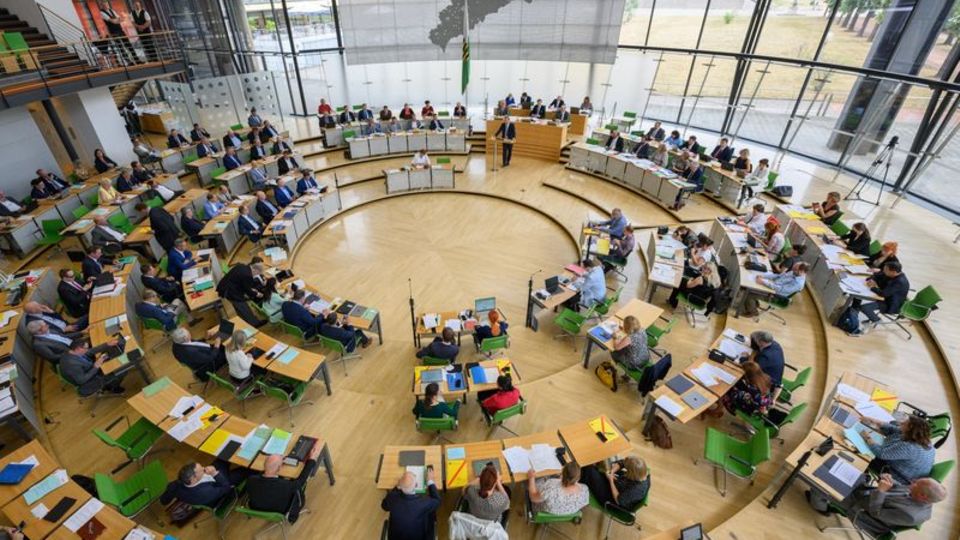Countries with concerns
Is the cannabis law dying in the Federal Council or is it not dying?
Cannabis plants in a field: The new law should, among other things, allow you to grow three plants yourself.
© Kay-Helge Hercher / Imago Images
Last hurdle? Or final failure? The Federal Council decides on the fate of the controversial cannabis law. Health Minister Karl Lauterbach warns that the project could “die”. The most important facts.
Again, Health Minister Karl Lauterbach (SPD) has to work behind the scenes Do cannabis persuasion work. Makes phone calls to get doubters and opponents on your side. Promises a few changes to the plans for the partial legalization of cannabis with a protocol statement at the last moment. The Bundestag passed the law after a long period of back and forth. Among other things, this should allow the possession of up to 25 grams of cannabisin your own four walls even up to 50 grams or the cultivation of three plants.
But the final hurdle has not yet been overcome: this Friday, the controversial project is on the agenda in the Federal Council. And there are many concerns in the countries. In February, the state interior ministers warned in a letter that the plans could increase organized crime. Recently, three committees of the Federal Council – Health, Interior, Legal Affairs – called for changes to the law passed in the Bundestag.
Cannabis law: There are concerns in the countries
The law is not a so-called consent law – the minister and everyone who supports rapid legalization are therefore not dependent on a majority of the states actually actively agreeing to the law. But you have to hope that the mediation committee will not be called upon. This committee is there to find a compromise if there is no consensus between the Bundestag and the Bundesrat.
A mediation committee would delay the law; it could not come into force on April 1st as planned. Some even fear that it might not happen again in this legislature. Not least the Minister of Health himself.
Cannabis legalization
The Bubatz Cabinet: These ministers have smoked weed before
It is difficult to predict whether this will actually happen. In quite a few cases, the coalition partners in the countries have different opinions. Should the mediation committee be contacted or not? And if so, in what form? For the law as a whole, or just for a specific aspect?
One thing is certain: there are numerous and serious concerns. One of these is an amnesty regulation enshrined in law. This stipulates that penalties relating to cannabis that have not yet been enforced or have not yet been fully enforced will be issued retroactively. The German Association of Judges, among others, has therefore warned against the judiciary being overburdened. For many countries, the regulation also comes at too short notice; it should apply from April 1st.
Statements from the Union may have startled some
Last week things looked bleak for the Health Minister. A mediation committee has still not been ruled out, but the tide may have changed in the meantime. A statement in the minutes in which Lauterbach promises some adjustments may also have had an influence on this. Even if he does not move away from the amnesty regulation: the federal government takes the concerns of the states seriously, it says in the document, but the remission of punishment is “necessary for reasons of justice.”
However, among other things, he holds out the prospect of more money for preventive measures and a change in the controls of growers’ associations. Until now, cannabis clubs in which members can grow the drug together were supposed to be inspected annually. The minister is now proposing the more flexible wording “regular controls”.
Some representatives of the SPD and the Greens may also have been alarmed by statements from Union politicians suggesting that they could not use the mediation committee to make changes to the law, but rather to implement a total blockade. Saxony’s Prime Minister Michael Kretschmer wrote on X, formerly Twitter, at the weekend: “My goal is that this law never comes out of the mediation committee again.” CSU regional group leader Alexander Dobrindt described this as “desirable” on Tuesday.
The concern is that the Union could prevent the law from even being put on the agenda of a possible mediation committee. Minister Lauterbach warned: “Every country co-governed by the SPD and the Greens must know that the cannabis law will die if you call the mediation committee,” he wrote on
It is still unclear what the decision will be on Friday. Bavaria and Saarland, for example, have declared in the past few days that they want to involve the committee. In other countries, such as Berlin and Lower Saxony, it looks like there will be abstention. Rhineland-Palatinate Prime Minister Malu Dreyer said on Tuesday that she does not expect the law to fail. However, many things will only be clarified at the last moment, said the SPD politician.
Only after various fireside chats on the Thursday evening before the Federal Council meeting did she know how Rhineland-Palatinate would finally vote. Everything is open until the end.



